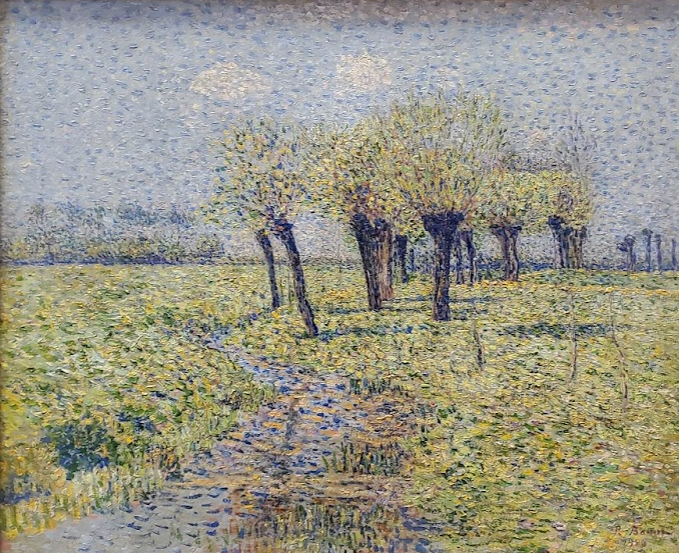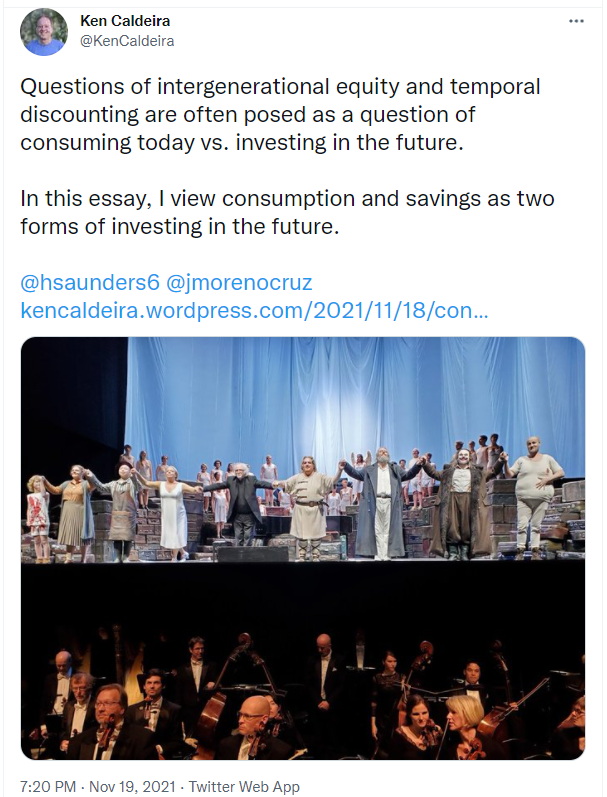Much of my work gets done by way of “productive procrastination”, that is, working on things other than what I “should” be working on. This in an example.
There have been differences of opinion about how best to address the question of temporal discounting, especially with respect to intergenerational equity and the climate problem. In its simplest form, this question is often framed:
How should we be valuing the future?
Lately, I have been taking a different tack on addressing this question, asking :
Why do we value the future as much as we do, and not more and not less?
One way of thinking about the discounting question is to ask: What is the relative value of consuming a thing versus owning a thing? How do we compare the consumption value of a thing versus asset value of a thing?
I have been working on a simple mathematical model to explore these issues, as a kind of “fiction science” – a make-believe world that I hope shares properties with the real world, to function as a mathematical metaphor.
From working with this model, I have convinced myself that we value the future as we do because organisms that valued the future (or at least, valued having an asset more than they valued consuming it) increased their evolutionary fitness.
The squirrel that buried the acorn was more likely to survive and successfully reproduce than the squirrel that didn’t bury the acorn.
The psychology of valuing the future is a product of an evolutionary process that tends to increase reproductive success and evolutionary fitness.

In an earlier version of my model, the agents hoarded assets until they had sufficient assets to achieve reproductive success. This led me to ask a question that I had never thought of before:
Why do we value current consumption as much as we do, and not more and not less?
If we are comparing consumption value versus asset value of a thing, we need to ask not only why we value the asset as much as we do, but also why we value consumption as much as we do.
And I think the understanding of consumption value largely parallels the understanding of asset value. We value consumption because consumption increases our evolutionary fitness.
If that squirrel did not eat acorns today, the squirrel will die and fail to reproduce. Note that the squirrel doesn’t die right now if it does not eat the acorn right now. Eating the acorn right now is another form of investing in the future.

Consumption value and asset value are two forms of investing in the future, and the balance between consumption value and asset value is the balance that tends to increase reproductive success and evolutionary fitness.
Humans are not squirrels. I doubt squirrels explicitly think very far into the future.
Evolution gives us psychological properties that manifest in unpredictable ways. Evolution, for example, did not select for the ability to play chess, but the ability to play chess is nevertheless a product of our evolutionary past.
One of the properties of human psychology is, when given the opportunity, we tend to consume far in excess of what might be thought to be optimal for maximizing fitness.
Diseases related to obesity and over-eating are rampant in wealthy societies.
Further, people who have enough money, often consume expensive clothing, automobiles, live in large and expensive homes, and so on. They display their consumptive behavior.
What is the explanation for the human tendency to want to consume far in excess of what might be thought sufficient to maximize fitness?
One possible contributing factor is that humans evolved in a resource limited environment, so that we evolved to consume as much as we possibly could, because in most of our evolutionary history, consuming as much as you possibly could directly maximized fitness.
However, one might also imagine that earlier in our past, consuming beyond what was needed to sustain life signaled to potential mates that a potential partner would have the resources to feed and care for offspring – and thus increase reproductive success.
Our drive to consume beyond what is needed to sustain our lives may be in part a consequence of a psychology that improved our evolutionary fitness by signaling our desirability as mates.
Observations indicate that financially successful people tend to be more sought after as mates than people who are living at a subsistence level.
The potential mate that is able to give valuable gifts is likely to be the potential mate that can provide for offspring, increasing reproductive success and evolutionary fitness.
People’s happiness tends to be associated with their amount of consumption relative to their peers, and less so to absolute levels of consumption. This is consistent with the drive to consume being closely tied to social signaling functions that increase evolutionary fitness.
Our drive to excessive consumption might be a bit like the peacock’s tail – something that, absent the signaling value, would decrease our evolutionary fitness; something that is maintained through sexual selection.
One might imagine that, in evolutionary equilibrium in a simple system with perfect information, the marginal benefit to fitness from consumption would equal the marginal benefit to fitness from savings. This, I think, is the conceptual underpinning of determination of the optimal savings rate from the perspective of evolutionary fitness.

Of course, we are not slaves to evolution.
We have a neo-cortex that not only allows us to play chess, but also allows us to be thoughtful about how we might increase our evolutionary fitness.
If our drive to excessive consumption is damaging the planet, we can use reason to develop ways to meet our psychological needs while lessening this damage. (An alternative is to deny our psychological desires, but this seems to be a much more difficult path both psychologically and politically.)

The increase in value from the service sector relative to the manufacturing sector (for example, the value we get from books, movies, music, and so on) points to ways that we can satisfy desires to consume with relatively little impact in the material world.
Rather than asking people to consume less, we can work on dematerialization of value generation. This can be done by expanding the service sector, for example by increasing the value of information and social relationships.
The internet is be a major step forward in human history. We are interacting with each other, often in real time, without the need for transportation. We are consuming music and videos and video games that can be replicated at very low marginal cost.
We may be entering a new era of increasingly dematerialized consumption may allow us to reconcile our evolutionary past with a future that places fewer material demands on our environment.
I thank Harry Saunders and Juan Moreno Cruz for contributing to some of the ideas expressed here.


